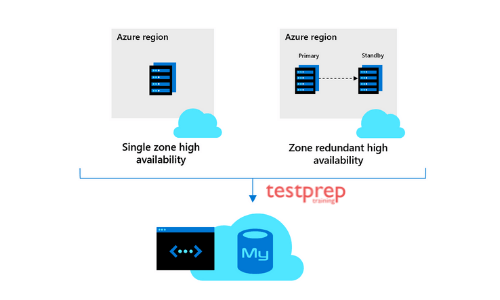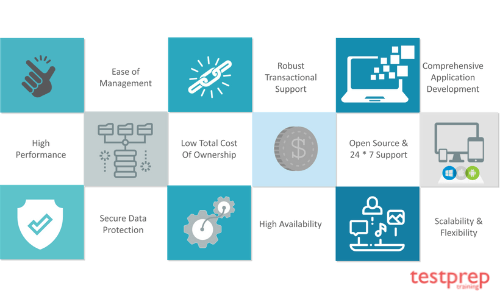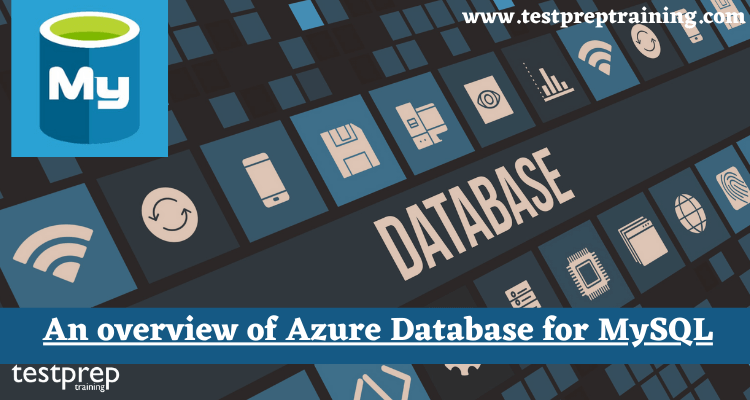Many companies are running brand-new and existing workloads to the Azure cloud. Most massive companies have been traditionally obtaining commercial off-the-shelf (COTS) database software because of the case that someone from Oracle or Microsoft will give support when an unforeseen situation happens. Smaller organizations have been working on open-source databases and OS (operating systems) to decrease the reoccurring software prices. Nonetheless, the combined maintenance hours of such systems ultimately sum up to money away. The prevailing trend in the business is to take benefit of a cloud provider’s (PaaS) Platform as a Service database to decrease the time to expand and manage such databases. The solution to this problem is Azure Database for MySQL. Let us discuss!
An Introduction
Microsoft published the global availability of Azure Database for MySQL in April of 2018. The Azure Database for MySQL is a completely managed database as a service that utilizes the MySQL community version. It can maintain the mission-critical workload with effective scalability. We can practice it to produce several applications that leverage open-source accessories and cross-platform applications.
Features of the Azure Database for MySQL:
- Replication
- Server Management
- Monitoring and Logs
- Also, service management
- Further, networking
- Backup and Restore
- High Availability
MySQL is a relational database management practice that is based on Structured Query Language. The application is practiced for an extensive range of determinations, involving e-commerce, data warehousing, and logging applications. The most popular use for MySQL though is for the direction of a web database. It can be utilized to collect anything from an individual record of data to a whole inventory of ready products for an online store.
Azure Database for MySQL presents:
- Built-in great availability.
- Data protection practicing automated backups and point-in-time-restore for up to 35 days.
- Mechanical preservation for the operating system, underlying hardware, and database engine to direct the service safe and up to date.
- Expected performance, utilizing comprehensive pay-as-you-go pricing.
- Flexible scaling in seconds.
- Cost optimization restrains with the ability to /start/stop server.
- Enterprise-grade security and industry-leading acquiescence to preserve sensitive data at rest and in motion.
- Observing and automation to analyze management and monitoring for large-scale deployments.
- Industry-leading maintenance experience.

Understanding the Benefits
Some of the reasons why businesses should opt for Azure Database for MySQL.
1. Scalability and Beyond
Firstly, flexible service plans for SQL Database satisfy the requirements of both small and big business users. Also, SQL is no great way out of range for more diminutive operations because the pricing structure enables users to pay as little as $4.99 per database every month with supreme storage set at 150 GB per database. That is a lot of places for very little expense.
2. High Speed and Minimal Down Time
High availability architectures suggest high-speed connectivity and data retrieval, also low downtime at the organization. There is zero worse than closing business because the technology can’t hold up, but that is not a problem with SQL Database.
3. Better Usability
SQL developers are accustomed to all information SQL and SQL Database can be refreshed with the SQL Server Management Studio or SQLCMD. Better yet, there’s no coding needed! Practicing standard SQL, it’s much more comfortable to maintain database systems without writing or updating a large amount of code.
4. Time Is on Our Side
With no administrative responsibilities in your physical place, employees can get time for imperative work to promote and grow all-around business accomplishment. When your database is received in the cloud, you do not possess to administer with setting up SQL Server, distributing databases, and administering with physical machine sustenance and upkeep. All of this appears in greater alignment of the organization and eventually more time on our side.
5. Easy-to-Use Migration Tools
Ramp-up time with SQL Database is now more straightforward than ever and free! Further, SQL Data Sync enables you to either sync the SQL Server-stored data or transfer the data without worrying about the costs to transfer by syncing gigabyte-sized tables.
Server Given by the Azure Database for MySQL
- Single Server– It is a completely managed database cooperation with minimum necessities for customizations of databases. The single server platform is created to manage most of the database management purposes such as backups, patching, high availability, protection with minimum user configuration and restraint. Further, the architecture is optimized to give 99.99% availability on a single availability region. Single servers are greatly suited for cloud-native applications created to manage automated patching without the requirement for the granular instruments on the patching agenda and practice MySQL configuration settings.
- Flexible Server– This server is a completely managed database service created to give extra granular control and compliance over database management purposes and configuration frameworks. Overall, the service gives more versatility and server configuration customizations correlated to the single server deployment which is based on the user demands. The flexible server architecture provides users to choose high availability within an individual availability zone and beyond multiple availability zones. Flexible servers also give more reliable cost optimization authorities with the capability to start/stop your server and burstable SKUs, a model for workloads that do not require complete compute capacity continuously.
Advantages of Flexible Servers:
- Application development requiring better control and customizations of MySQL engine.
- Zone redundant high availability
- Managed maintenance windows
MySQL on Azure VMs– This falls into the industry classification of IaaS. With this setting, you can operate MySQL Server within a managed virtual machine (VMs) on the Azure cloud platform. All latest versions and releases of MySQL can be established in a virtual machines.
There are several options for operating MySQL databases as a service on Microsoft Azure cloud:
- Azure Database for MySQL—Azure database service that lets to work a managed database instance, offloading database administration duties from the team, including backups, scalability, and high availability.
- Azure Database for MySQL: It is a Flexible Server—It is a managed service that gives extra control over the setup of MySQL database, and permits high availability over multiple availability zones.
- Self-managed MySQL on Azure virtual machines— Provides the high level of control across the database server, and enable us to set up configuration, environment, and tuning just like you would in the local data center.
Pricing for Managed Deployment
Azure Database for MySQL managed assistance is granted under 3 pricing models:
- Basic— It is fitting for the databases that need light to compute power and reasonable I/O performance. For instance, developing or testing databases.
- General Purpose— This gives compute capacity and memory for common production databases, with scalable I/O throughput. For instance, a database utilized for a web or enterprise administration.
- Memory-Optimized— This can assist databases that need a very quick transaction process and/or a high number of concurrent users. For instance, a database is used for real-time analytics.
There are several options for running MySQL databases as a service on the Microsoft Azure cloud:
- Azure Database for MySQL—an Azure database service that lets you run a managed database instance, offloading database administration tasks from your team, including scalability, backups and high availability.
- Azure Database for MySQL: Flexible Server—currently in preview, is a managed service that provides more control over the setup of the MySQL database, and enables high availability across multiple availability zones.
- Self-managed MySQL on Azure virtual machines—this provides the highest level of control over the database server, and allows you to set up environment, configuration, and tuning just like you would in your local data center.

Azure Database for MySQL: Single Server
Azure Database for the MySQL Single Server provides a completely managed database service established for minimum database customization demands. The platform holds the community version of MySQL, incorporating versions 5.6, 5.7, and 8.0. The architecture of a Single Server is created with built-in high availability and gives a 99.99% availability on unique availability zones (AZ). The service is usually available beyond a broad scope of Azure regions.
Single servers are perfect for cloud-native applications that are developed for automatic patching. Optionally, applications that do not need granular control for the patching scheduling and customized MySQL configurations.
Azure MySQL Backup and Replication in the Managed Deployment
Azure Database for MySQL gives automated backups of a whole MySQL server, incorporating data folders and transaction logs. If there is a problem with the Azure MySQL server, we can create a point-in-time restore from backup. The backup maintenance period is one week by default and can be increased up to 35 days.
We can choose to store backups in locally redundant storehouses or on more flexible geo-redundant storage. Also, Azure backups are encrypted utilizing AES 256 encryption.
Additionally, the Azure Database for MySQL presents two central replication options:
- Data-in replication— Synchronizing a MySQL database expanded locally, or in a different cloud provider, with an Azure-based MySQL database. This is fitting for the hybrid scenarios.
- Read replicas—It lets you replicate data from Azure Database on the MySQL to up to 5 read-only MySQL models. Replication is executed asynchronously. This is essentially fitting for databases with a high load of reading operations.
How Does the Self-Managed MySQL on Azure operate?
In many situations, especially for large or mission-critical databases, a healthy option to Azure-managed database services is to extend MySQL on the Azure VM. This suggests we require to install and expand the database on the Azure VM instance and attach Azure Managed Disks as enduring storage.
If you administer MySQL yourself, you have to install it up and manage it just as you would do in your own data center. Nevertheless, you can utilize VM images to create things easier:
- We can make an Azure VM image and utilize it as a template for the new MySQL VMs.
- We can download an Azure Marketplace VM image, with the help of MySQL preinstalled, and with configuration previously in place, consisting high availability. WE have to note that few machine images are free, and some of them have a flat or per-hour cost.
Final Words!
Lastly, the platform is established to manage the bulk of database management abilities, incorporating patching, backups, and high availability, also security that arises with minimum user configuration and control. We hope that the article helped you! Stay safe and keep practising!



